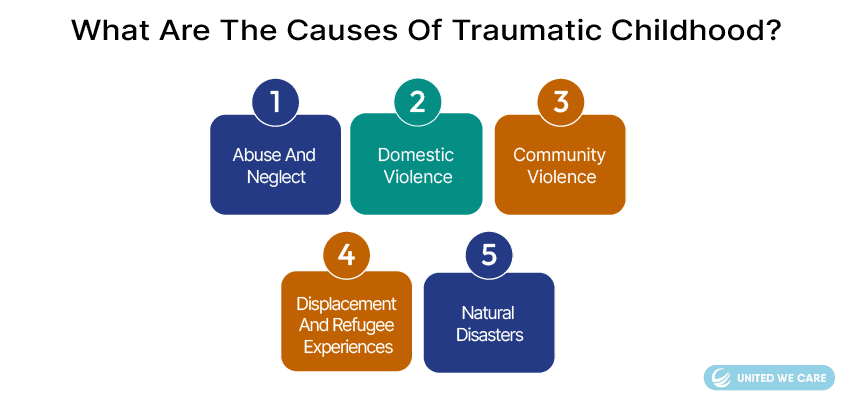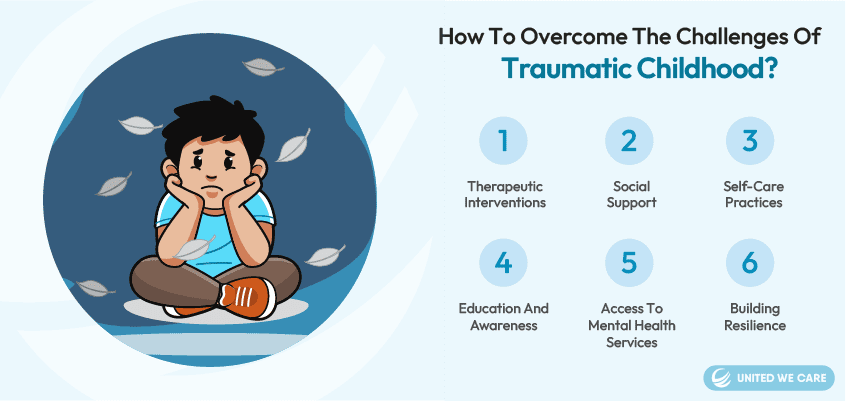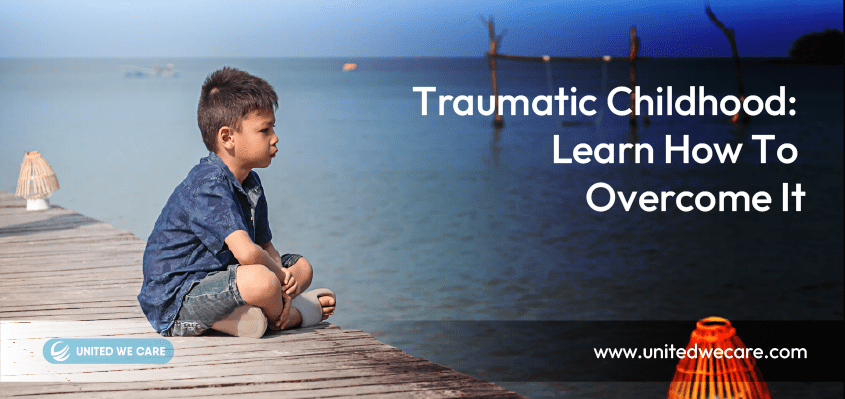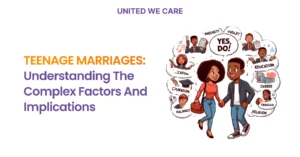Introduction
Let me begin by sharing a real-life story. A bubbly and cute little girl once brought a smile to everyone’s faces when people looked at her. She was a curious little soul and made many friends every day. She included everyone in her ever-expanding circle – playing games, wandering around, and giggling her heart out. However, this little girl started getting into fights, throwing tantrums over minor things, like the dresses her mother would choose for her. She constantly wanted things to go her way, trying to control every aspect of her life and those of others around her, and therefore, her life became a loop of friends and people coming and leaving. And then came the point where she started leaving friendships, relationships, and work behind before people left, and she got hurt again, continuing well into adulthood.
The reason behind this was the trauma the little girl faced as a child. Traumatic childhood experiences can impact a child’s mental and emotional development. Such events can leave long-term scars on such children.
“Trauma is a topographical map written on the child, and it takes a lifetime to read.” -Natasha Lyonne [1]
What Does Traumatic Childhood Mean?
Trauma comprises of negative events that can hurt an individual mentally, emotionally, and socially. Such events can include experiencing natural disasters, accidents, the death of a loved one, war, and physical or sexual abuse. Research shows that every 1 in 7 children faces at least one type of trauma in their lives [2].
Witnessing traumatic events at a young age can trigger mental health disorders in an individual. These mental health disorders can include post-traumatic stress disorder (PTSD), depression, anxiety, and substance abuse. These individuals may also find it difficult to form and maintain healthy relationships. Their academic and career prospects may also suffer [3].
Physical health also gets impacted by having experienced a traumatic childhood. Such individuals are prone to developing chronic health conditions like heart disease, diabetes, obesity, hypertension, and even cancer [3].
Read more–Early symptoms of childhood anxiety.
What are the Causes of Traumatic Childhood?
Children are vulnerable beings. Their sensitivity, innocence, and innate caring abilities make them more impressionable. There can be multiple causes for a traumatic childhood [4]:

- Abuse And Neglect: One of the primary causes of an individual having experienced a traumatic childhood can be abuse or neglect from loved ones. When a child goes through abuse, in most cases, it is someone from the family or known to the family. Abuse can also be physical, sexual, or emotional.
- Domestic Violence: Fights happen in all relationships. So it is only natural for parents also to fight. However, seeing violence between parents can deeply impact a child’s well-being.
- Community Violence: There has been a rise in crime rates globally. In some cases, an entire family might be involved in community violence. A child born and raised in such an environment is more likely to experience a traumatic childhood.
- Displacement and Refugee Experiences: Globally, several countries are at war. Being forced to experience war, conflict, and biased treatment can increase the risk of experiencing trauma. Children who face such trauma may further experience loss of home, separation from family, and emotional and financial instability.
- Natural Disasters: Natural disasters can cause a lot of disruption to the routine lives of all individuals. For children, this exposure can trigger anxiety and a feeling of uncertainty.
To get more information about-Early symptoms of childhood depression
How does having a Traumatic Childhood Affect an Individual?
Most of us, when we think about our childhood, a faint smile might come on our face because of the happiness and peace we felt as children. For children who experienced a traumatic childhood, these thoughts can trigger an intense response [5] [6]:
- Mental Health Issues: Experiencing childhood trauma can trigger mental health concerns. There might be a high chance of an individual suffering from symptoms of anxiety, depression, substance abuse, and even post-traumatic stress disorder (PTSD).
- Physical Health Consequences: Trauma can impact an individual’s physical well-being as well. Most people who experienced trauma as children are at a greater risk for developing heart issues, obesity, diabetes, stomach issues, arthritis, and even cancer or other autoimmune diseases.
- Impaired Social Functioning: When you go through trauma, finding comfort in other people becomes difficult. Such individuals may find it hard to trust someone or be able to speak in public. They may lack social skills, which can stop them from building healthy interpersonal relationships.
- Academic and Occupational Difficulties: Individuals who have faced trauma in their childhood might have had issues concentrating on their academics as children and even as adults. Such adults may experience dissatisfaction at work and may not work to their best potential.
- Inter-Generational Impact: Trauma travels through generations. The impact of trauma can change the very DNA of the human race. Sometimes, children and grandchildren of people who faced childhood trauma are likely to experience drastic effects.
How to Overcome the Challenges of Traumatic Childhood?
Most often, we, as humans, are capable of bouncing back from any sad events or situations. Bouncing back from childhood trauma may be difficult but possible [7] [8]:

- Therapeutic Interventions: Taking therapy is one of the best ways of finding your life back after traumatic childhood events. Trauma-focused cognitive-behavioral therapy (TF-CBT), eye movement desensitization and reprocessing (EMDR), and dialectical behavior therapy (DBT), Hypnotherapy are effective techniques for overall healing from such events.
- Social Support: Many people around us may have experienced similar events in their lives. Talking to them and seeking their support can bring a sense of belongingness, understanding, and acceptance. Family, friends, or support groups can help us put our lives back on track and provide practical solutions.
- Self-Care Practices: Having a routine and self-care practices can help us bounce back and put our lives on track. We can indulge in exercising, relaxation techniques, mindfulness, and hobbies that help us relieve our stress.
- Education and Awareness: Many people face stigma from people around them, specifically in cases of sexual abuse. There is a need to increase awareness amongst individuals, families, communities, and professionals so that they can understand the effects of childhood trauma. Doing so can help those around us support us in a better way.
- Access to Mental Health Services: Although there are many mental health professionals globally, access may still be an issue for most people. Most psychologists are unaffordable and unavailable. At United We Care, you can find quality services with professionals trained in using a trauma-informed approach.
- Building Resilience: Traumatic childhood can hamper how a person responds to situations. Developing coping skills and building healthy relationships can help such people bounce back and feel empowered.
Read more- Why do I miss my Childhood
Conclusion
A traumatic childhood impacts an individual’s life, affecting them mentally, physically, and socially. They can develop mental health disorders, physical ailments, relationship difficulties, and career challenges. A holistic approach using therapy, self-care, and support from people can help build resilience. Creating education and awareness amongst community members can change the world we live in.
If you or someone you know has experienced a traumatic childhood, seek support from our dedicated team of wellness and mental health experts at United We Care. We provide compassionate guidance and tailored methods to promote your well-being and healing.
References
[1] “Natasha Lyonne Quotes (Author of Space),” Natasha Lyonne Quotes (Author of Space). https://www.goodreads.com/author/quotes/13734259.Natasha_Lyonne
[2] “Adverse Childhood Experiences (ACEs),” Adverse Childhood Experiences (ACEs), Jun. 29, 2023. https://www.cdc.gov/violenceprevention/aces/index.html
[3] “Understanding Child Trauma,” Understanding Child Trauma – What is Childhood Trauma? | SAMHSA, Mar. 17, 2023. https://www.samhsa.gov/child-trauma/understanding-child-trauma
[4] T. Falasca and T. J. Caulfield, “Childhood Trauma,” The Journal of Humanistic Counseling, Education and Development, vol. 37, no. 4, pp. 212–223, Jun. 1999, doi: 10.1002/j.2164-490x.1999.tb00150.x.
[5] R. LUBIT, D. ROVINE, L. DEFRANCISCI, and S. ETH, “Impact of Trauma on Children,” Journal of Psychiatric Practice, vol. 9, no. 2, pp. 128–138, Mar. 2003, doi: 10.1097/00131746-200303000-00004.
[6] “Effects,” The National Child Traumatic Stress Network, Jan. 30, 2018. https://www.nctsn.org/what-is-child-trauma/trauma-types/complex-trauma/effects
[7] “How to Reduce Long-Term Effects of Childhood Trauma | Banner,” How to Reduce Long-Term Effects of Childhood Trauma | Banner, Jun. 13, 2020. https://www.bannerhealth.com/healthcareblog/teach-me/how-to-reduce-the-long-term-effects-of-childhood-trauma
[8] R. Kagan, Rebuilding Attachments with Traumatized Children: Healing from Losses, Violence, Abuse, and Neglect. 2013.









